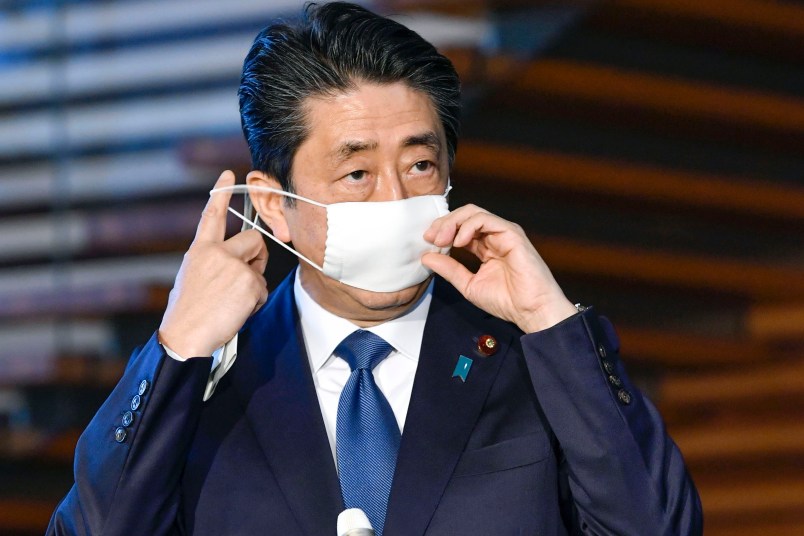TOKYO (AP) — Japanese Prime Minister Shinzo Abe said that he will declare a state of emergency for Tokyo and six other prefectures as early as Tuesday to bolster measures to fight the coronavirus, but that there will be no hard lockdowns.
Abe also told reporters Monday that his government will launch a 108 trillion yen ($1 trillion) stimulus package — Japan’s largest ever and nearly twice as much as expected — to help counter the economic impact of the pandemic, including cash payouts to households in need and financial support to protect businesses and jobs.
Abe said experts on a government-commissioned task force urged him to prepare to declare a state of emergency, with the COVID-19 outbreak rapidly expanding in major cities including Tokyo, and hospitals and medical staff overburdened with patients. He said the state of emergency will cover Tokyo, Osaka, Fukuoka and four other hard-hit prefectures, and will be in effect for about a month.
Measures are expected to include a stay-at-home request for residents, but there will be no penalties for objectors. Public transportation, banks, groceries and other essential services will continue operating.
Abe said the state of emergency is intended to further reinforce social distancing between people to slow the spread of the outbreak, and to maintain as much social and economic activities as possible.
“But we need to ask everyone to step up cooperation,” he said.
The government enacted a special law in March that paved the way for Abe to declare a state of emergency. The law, however, is a divisive one because it could limit civil rights.
Abe said he will hold a news conference on Tuesday to further explain the state of emergency.
The economic package — which amounts to about 20% of the GDP of Japan, the world’s third-largest economy — will pay out 300,000 yen ($2,750) to each household with severe income loss due to the outbreak, and will include 26 trillion yen ($238 billion) to address delays in taxes and social welfare payments, Abe said.
“It’s to protect the people’s health and their lives,” he said.
Tokyo Gov. Yuriko Koike said the city will start transferring patients with no or slight symptoms from hospitals to hotels and other accommodations to make room for an influx of patients with severe symptoms.
Koike has raised alarms over the acceleration of the outbreak in the Japanese capital since late March, warning of an “infection explosion” and saying that the only way to avoid a complete lockdown of the city is to follow guidelines such as social distancing.
Haruo Ozaki, head of the Tokyo Medical Association, said that the situation in Tokyo “is already critical.” He said Tokyo’s infections are on the brink of being out of control due to a lack of restraint by residents.
Japan had kept its number of coronavirus cases relatively low by closely watching clusters and keeping them under control rather than conducting massive tests, but that strategy has become increasingly difficult because of a sharp rise of unlinkable cases.
Japan’s health ministry has confirmed 3,654 cases, including 84 deaths, as well as another 712 infections and 11 fatalities on a cruise ship that was quarantined in the port of Yokohama near Tokyo earlier this year.
___
Follow Mari Yamaguchi on Twitter at https://www.twitter.com/mariyamaguchi







Next Abe will be humping chloroquine.
Shouldn’t Abe have hard lockdowns? Is he following the footstep of his BFF Codiviot Trump?
“requests”
i was worried that there was a new outbreak in Japan sounds like this is more precautionary. It’s amazing that Japan has had so few cases given the crowding in Tokyo. They have been on the ball with testing and tracking but, i do wonder if there’s more going in their favor?
My step-daughter lives in Osaka and my wife has visited there a couple of times, so I’m somewhat familiar it.
There are a few cultural advantages in dealing with a pandemic, like being obsessive about cleanliness compared to many other culture. The "toilets"are like something out of a science fiction movie. They’re a bit less touchy-feely than Western countries when it comes to personal interactions. You’ll see packed crowds on a subway, but they still maintain as much personal space as they can; just an instinct from living so close together. There is also less of a cultural stigma about wearing masks than many Western countries.
Finally, if it does come to a hard lockdown, there won’t be many who violate it. It’s a culture with a high respect for authority.